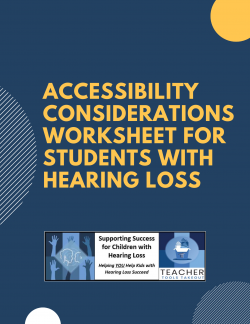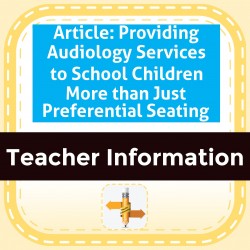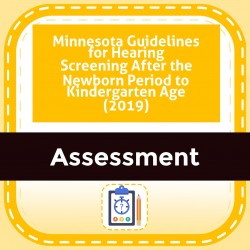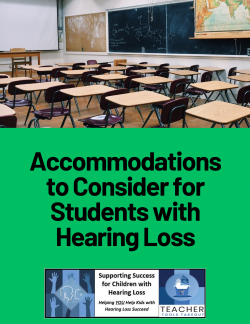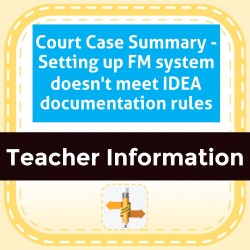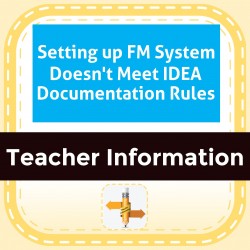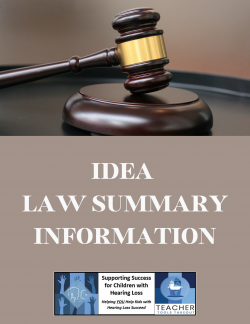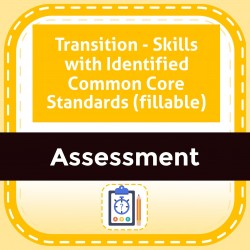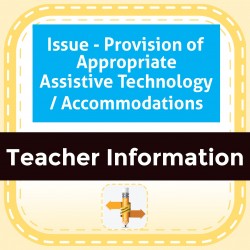Ability Levels
Categories
Resource Types
Age/Grade Range
CCSS
Anchor Standard
Speaking & Listening
Language
Reading
New Teacher Bundle
$ 40
The New Teacher resource is an invaluable bundle packed with information you can use to explain the impact of hearing loss to your student's teachers and parents. 30 pages of resources. The New Teach
...
acher Combo includes:1. Impact of Hearing Loss on Listening, Learning, and Social Interactions (5 pages)2. Emailable, computer fillable SIFTERs (Preschool, Elementary, Secondary) (6 pages)3. Emailable, computer fillable LIFE-R Teacher Appraisal (2 pages)4. Emailable, computer fillable Access to Curriculum Inventory (ATCI) for General Education Teacher (3 pages)5. Children with Hearing Loss Miss More Than You Think (1 page)6. Listening Comprehension Exercise – Mother’s Aprons (1 page)7. Barriers to Listening – Visual analogies of listening in noise, reverberation, and distance (5 pages)8. Student Listening Challenges – Understanding the Missing Pieces (1 page)9. Attitude is Caught, Not Taught (teacher version) (1 page)10. Hearing Aid/Cochlear Implant Monitoring and the Law (1 page)11. Hearing Aid Monitoring – An Important Daily Activity (4 pages)12. Emailable Tips for Teachers (Early Childhood + K-12) Word version (15 pages)
Accessibility Considerations Worksheet for Students with Hearing Loss (fillable)
$ 150
Communication access is a key component of 504, IDEA and Title II of the ADA. Under Title II of the ADA, schools are required to ensure that communication access is as effective for children with hear
...
ing loss as it is for their typically hearing peers through the provision of appropriate auxiliary aids and services. This handout provides a forum for team discussion of the need for auxiliary aids and services for different school situations so students can receive information from, and convey information to, others as effectively as students without disabilities.
Article: Providing Audiology Services to School Children More than Just Preferential Seating
$ 0
This informational article describes the need to define and understand a student's ability to access verbal instruction. It includes description of the SpeECH- Audibility Audiogram for Classroom Liste
...
ning. 2011.
Minnesota Guidelines for Hearing Screening After the Newborn Period to Kindergarten Age (2019)
$ 0
Minnesota guide to hearing screening for children after newborn age until five years old - including pass/refer criteria, frequency of screening, ideal setting for screening, necessary training, docum
...
entation for hearing screening, and monitoring program quality.
Accommodations to Consider for Students with Hearing Loss
$ 0
One-page checklist for school teams to use when considering school accommodations for students with hearing loss.
Court Case Summary - Setting up FM system doesn't meet IDEA documentation rules
$ 0
Summary of a 2015 court case in which a school was found to have violated IDEA because there was no documentation of daily availability of FM or use by student.
Setting up FM System Doesn't Meet IDEA Documentation Rules
$ 0
Information about a court case regarding school district record keeping requirments to comply with provision of FM/DM/HAT in an IEP.
IDEA Law Summary Information
$ 0
The information below has been derived from sections of the law, Office of Special Education Program comments and may be useful to professionals and parents alike who are trying to advocate appropriat
...
e services and supports for children with hearing loss.
Transition - Skills with Identified Common Core Standards (fillable)
$ 295
Progress monitoring sheet specifying student skill areas for transition with the specific common core standard identified for each skill area. Fillable.
Issue - Provision of Appropriate Assistive Technology Accommodations
$ 0
The information below on provision of assistive tECH-nology has been derived from sections of IDEA and Office of Special Education Program comments. The guidance provided helPS- clarify the intent of
...
IDEA and may be useful to professionals and parents alike who are trying to advocate appropriate services and supports for children with hearing loss.
 Your browser is out of date. For best experience switch to latest updated Browser.
Your browser is out of date. For best experience switch to latest updated Browser.
 Get Chrome
Get Chrome Get Edge
Get Edge Get Firefox
Get Firefox
